
Scientists are working on a new line of technical equipment that can dramatically improve gravitational wave detectors.Gravitational wave detectors are extremely sensitive and can register ripples in the space-time fabric created by colliding neutron stars in space.Yet even higher sensitivity is sought for in order to expand our knowledge about the Universe.Researchers from University of Copenhagen in Denmark are convinced that their equipment can improve the detectors.
“We should be able to show proof of concept within approximately three years,” Eugene Polzik, a professor at the University of Copenhagen, said.
If the scientists are able to improve the gravitational wave detectors as much as they “realistically expect can be done,” the detectors will be able to monitor and carry out measurements in an eight times bigger volume of space than what is currently possible, said Polzik.
In October last year, a large international team of scientists confirmed the existence of gravitational waves by detecting ripples from the collision of two neutron stars; an event which took place 140 million light years from Earth.The gravitational waves – moving at the speed of light – were registered by three gravitational wave detectors: the two US-based LIGO-detectors and the European Virgo-detector in Italy.
“These gravitational wave detectors represent by far the most sensitive measuring equipment man has yet manufactured – still the detectors are not as accurate as they could possibly be,” Polzik said. “And this is what we intend to improve.”
In a study published in the journal Physical Review Letters, scientists outlined how this can be achieved.
“Our calculations show that we ought to be able to improve the precision of measurements carried out by the gravitational wave detectors by a factor of two,” said Polzik.”If we succeed, this will result in an increase by a factor of eight of the volume in space which gravitational wave detectors are able to examine at present,” he added.


